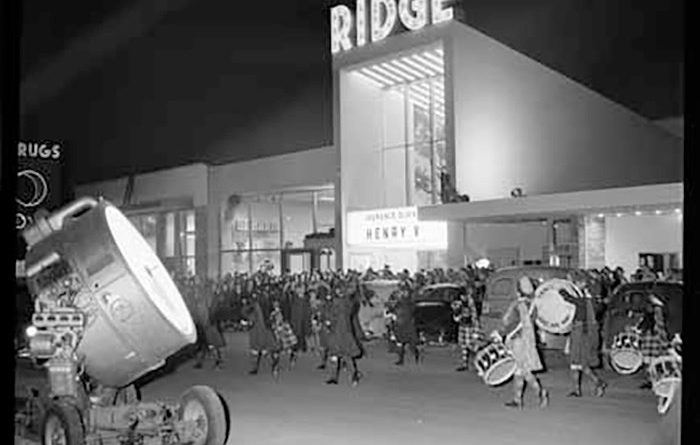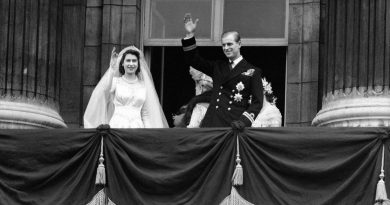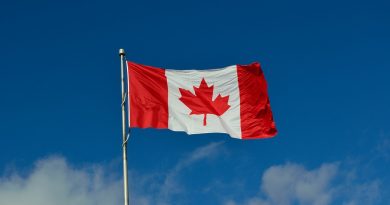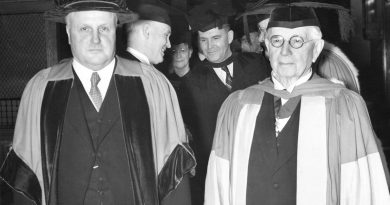1950
Above: The Ridge Theatre opened in 1950.
[Image: Artray photo, Vancouver Public Library VPL 81242]
*****************************************
You’ll note that these years include events listed under “Also in . . .” These are events for which we don’t have a specific date. If YOU know the specific date of an event shown there, please notify us . . . and cite the source! Many thanks!
*****************************************
January 3 The comic strip Pogo, a huge hit in the States where it had started October 4, 1948, debuted in the Vancouver Sun.
January 12 First family moved into Fraserview Development.
January 13 Hedley Hipwell was returned for a fourth term as President of Greater Vancouver Tourist Association. Hipwell also headed the BC Automobile Association. Both groups shared directors.
February 14 Nancy Hodges presided over the opening of the BC Legislature, the first female speaker in the British Commonwealth. She was a well-known Victoria journalist and women’s rights advocate, served as an MLA from 1941 to 1953. She was appointed to the senate in 1953, the first MLA from BC to achieve that.
February The Crescent Beach Hotel burned down.
March 15 A new passenger terminal opened at Vancouver International Airport.
April 13 The Ridge Theatre opened at 3131 Arbutus in Vancouver.
Spring Vandals painted White Rock’s white rock black, enraging citizens who had to pay for the clean-up.
May Patricia Kronebusch became Cloverdale’s first Rodeo Queen.
June 14 Michael Costello, now head of BC Hydro, was born in Montreal.
June 21 Mayor Thompson received the deed to Hadden Park, on behalf of the children to whom Harvey Hadden has dedicated it.
June 26 North Korea invaded South Korea, and the Korean War began.
August 7 From the Province came a story about a submachine-gun being used in a Vancouver robbery. “Masked bandits held four B.C. Electric employees at bay with a sub-machine gun early today in a ticket office raid which netted only $59. It was the first time such a weapon had been used in a city holdup . . . Police said the raid on the B.C. Electric carbarns ‘bullpen’ at Thirteenth and Main was staged by two men at 3:30 a.m., when most streetcars were in for the night and about 15 minutes before the morning shift was due to arrive.” (Note the difference in style: in 1950: sub-machine gun. Today: submachine-gun.)
August 12 Van Waters & Rogers Ltd. was incorporated in Vancouver. It was the Canadian affiliate of a company founded in 1924 in Seattle by George Van Waters and Nat S. Rogers. Today, the company—dealing in industrial chemicals—is known as Univar Canada, the sponsor of 1950 in The History of Metropolitan Vancouver.
August 15 The Royal Canadian Mounted Police began policing British Columbia when the B.C. Provincial Police force was dissolved after 92 years of service. All their duties were assumed by the RCMP.
Also August 15 Princess Anne was born.
August 22 The first Canada-wide rail strike began. It ended by government order August 30.
August 29 Eccles-Rand Limited personnel checked out Vancouver’s first atomic bomb shelter, which their firm had built in an unidentified Shaughnessy backyard.
September 1 A national CPR strike hit Port Coquitlam hard, as many residents worked in marshalling yards there.
Also September 1 Park Royal Shopping Centre opened in West Vancouver, the first regional shopping centre in Canada. Originally on the north side of Marine Drive, it later expanded to the south. (Northgate Mall opened this same year in Seattle.)
September 17 The last run of Vancouver’s open-air streetcars and an end to the astonishing career of tour guide Teddy Lyons. These famous observation cars were built by the B.C. Electric in 1909 in their New Westminster shops, and Portage La Prairie-born Teddy was a “spieler” aboard #124 from 1911 to 1950, an astonishing 39 years. He pointed out interesting sights, told corny jokes (Pointing up at seagull: “There’s the richest bird in Vancouver—he just made a deposit on a brand-new Cadillac”), passed along local history . . . he was famous, he was perfect. Someone calculated Teddy had travelled 930,000 kilometres through the city during his tour-guide career. Hamming it up to the end, Teddy yanked out a hankie to dry his tears for photographer Art Jones.
September 21 Vancouver’s city engineer John Oliver said he feared that, unless the provincial and dominion governments contributed to the cost of the Granville Street bridge, the project would cost $3 million more than the original $8 million estimate. (In 1939 the cost had been estimated at $4 million.) As it happens, neither government came through and the final cost to the city by the time the bridge opened in February 1954 was $16 million.
September 29 Vancouver’s Sunset Memorial Centre, at 404 East 51st Avenue, was officially opened—via a telephone call from Hollywood—by singer Bing Crosby. Bing was awfully fond of B.C., used to come up here often to relax and fish, but he was filming. A year later he managed to visit the centre and drew a huge crowd. (The name today is the Sunset Community Centre.)
September 30 Over the protests of local people a B.C. Electric tram made the last run between New Westminster and Chilliwack. A settlement is made in which B.C. Electric contributed to the cost of establishing bus transportation. Businesses complained mail was slower.
September The fall assizes opened with the first Chinese juror, Jack Chan, on jury duty.
October 2 Clarence Wallace was sworn in as B.C.’s lieutenant governor, succeeding Charles Arthur Banks.
Also October 2 The comic strip Peanuts first appeared.
November 8 The Province reported that Captain “Gerry” Lancaster had written a history of the port of Vancouver. It’s at the Vancouver Public Library, call number NW 387.1 L24p.
November 11 The West Vancouver Memorial Library opened. An earlier library had been opened in 1921 but closed during the Depression.
November Sargit Singh and Bob Bose of Surrey won the Canadian championship in potato judging at the Royal Winter Fair in Toronto.
December 19 Book salesman extraordinaire Dave Kerfoot was born.
Also in 1950
Japanese Canadians are finally allowed to return to Vancouver.
Hugh Pickett, with partner Holly Maxwell, took over the management of Famous Artists Limited. Pickett eventually bought Maxwell’s share of the business, would run it to 1982 when he sold it to Jerry Lonn of Seattle.
Irving House, once home to Capt. William Irving and his family, was purchased by the city of New Westminster for use as a historic centre. It’s still that today, a fascinating place.
A modern sewage plant was installed at White Rock, and 1,200 homes and businesses were connected with the disposal plant.
Four-room Gleneagles School, the first in the area, opened near Horseshoe Bay.
Zoning problems in Surrey grew more acute as farmers, businesses, industry and residents found their interests conflicting. It became necessary to establish a town planning committee at Municipal Hall.
The Vancouver Sun established Camp Gates on Bowen Island for its paper carriers, named for Herb Gates, the circulation manager.
Thirteen kilometres of double-lane road to the top of Mount Seymour was completed.
The first diesel train came to White Rock. In the 1950s there will be three trains a day (9 am, 1 pm and 9 pm) and residents will set their watches by them.
Influential Canadian artist Jack Shadbolt built a house on Capitol Hill in Burnaby.
The Ukrainian Orthodox Church was built at 154 East 10th. It’s a heritage building today.
Vickers Haywood died, the last survivor of the original Vancouver City Police. Haywood had been hired by Chief Constable Stewart in 1886.
At the British Empire Games in Auckland, New Zealand, North Vancouver’s Bill Parnell won the mile event, setting a new Games record with a time of 4:11.0. Parnell also won bronze in the 880yd (1:53.4). See this website.
Vancouver’s Jack Varaleau, a member of the Canadian Olympic weightlifting team from 1948 to 1952, won a gold medal in weightlifting at the British Empire Games.
J.V. Clyne, a prominent Vancouver lawyer, was appointed to the B.C. Supreme Court.




